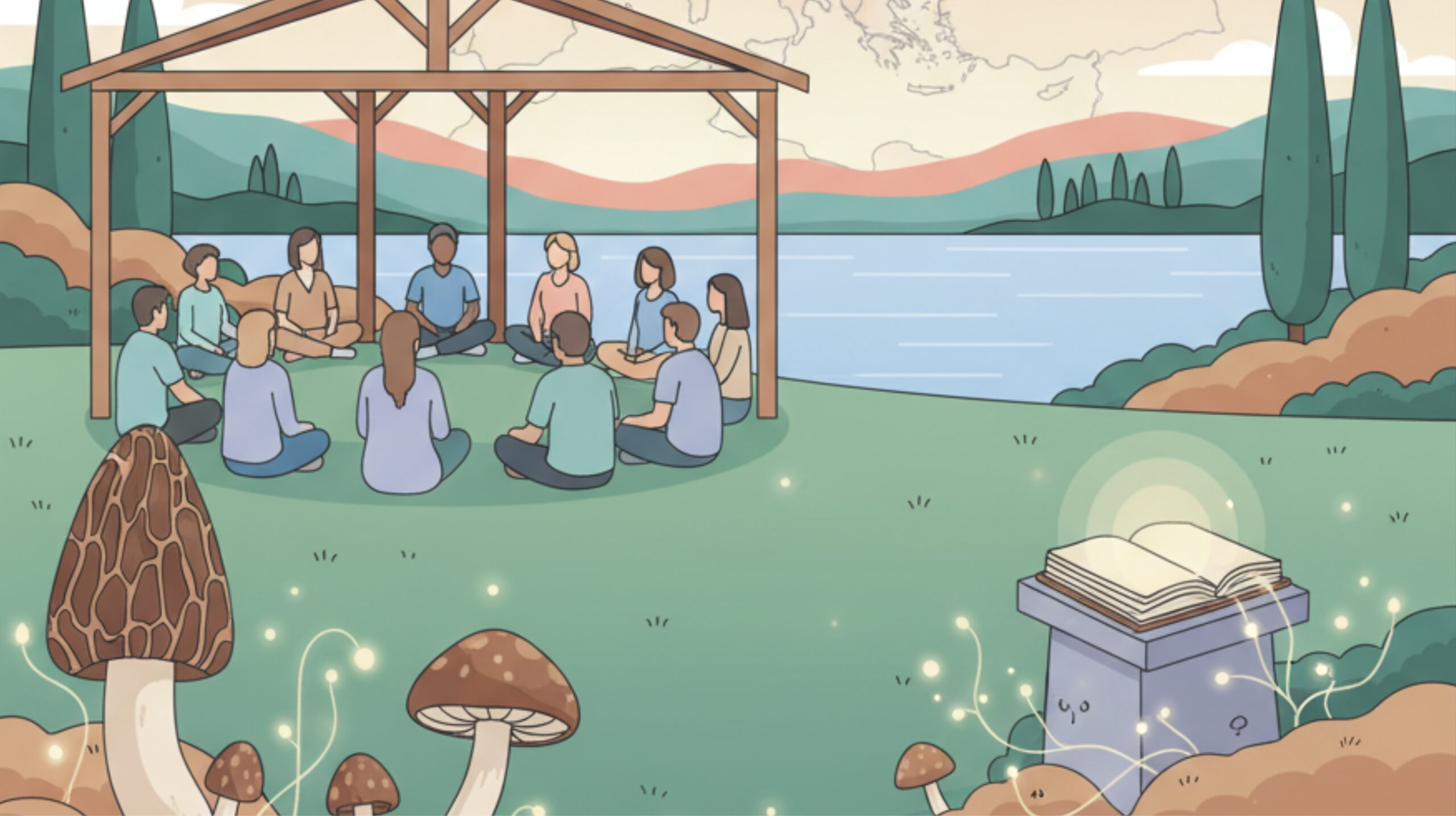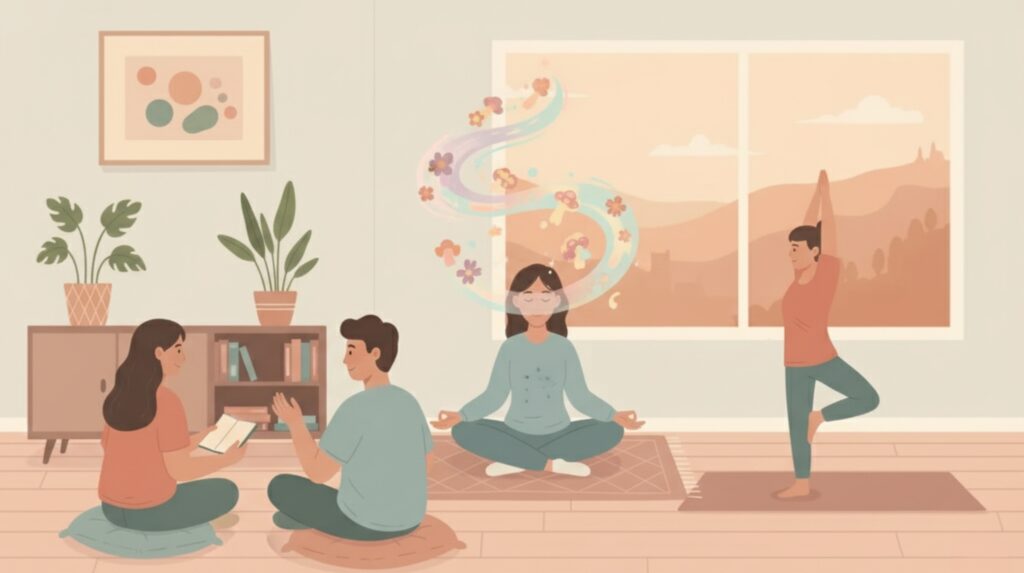
Psychedelic Retreats in Europe: The Complete Guide to Legal, Safe, and Transformative Experiences
Psychedelics are as visible as they’ve ever been, from clinical research to governmental policy to bougie retreats. And no continent is as ahead of the curve in all three of those areas as Europe.
For people looking to harness the psychologically transformative properties of psychedelics, retreats are going to be the safest and most practical option. These compounds can help people look deeper within themselves to confront uncomfortable thoughts and break through mental barriers that are holding them back—in their careers, jobs, or really any aspect of life. But the landscape can be confusing, and legal status varies dramatically by country, quality differs widely between providers, and knowing what to expect requires careful research.
This guide offers a comprehensive overview of psychedelic retreats across Europe, helping you understand the legal framework, what different experiences entail, and how to choose safely and thoughtfully.
What Is a Psychedelic Retreat?
A psychedelic retreat is a multi-day program consisting of group discussions, structured downtime, meditation, and psychedelic ceremonies, where MDMA or psilocybin—never at the same time—are typically consumed.
These retreats are a part of a longer, more comprehensive program that typically lasts at least a month. They include pre-retreat preparation (sometimes including online sessions), arrival and community building, intention-setting, the facilitated psychedelic experience itself, group sharing and processing, and structured integration work to help participants incorporate insights into daily life.
Retreats are not the same as clinical trials or psychedelic-assisted therapy, which are considered controlled medical interventions for specific conditions like depression or PTSD. Retreats are better defined as personal development experiences with potentially therapeutic results.
The key differences include:
- Clinical trials involve strict protocols, medical supervision, psychiatric screening, specific dosing regimens, and formal outcome measurements. Participants are typically seeking treatment for diagnosed conditions and receive extensive one-on-one therapeutic support.
- Psychedelic-assisted therapy combines medicine sessions with preparatory and integration psychotherapy, focusing on specific therapeutic goals within a licensed healthcare context.
- Retreats emphasize personal growth, spiritual exploration, and community experience alongside therapeutic benefits. While quality retreats include screening and facilitator support, they operate within wellness frameworks rather than medical ones. This can offer more flexibility and accessibility, but also means less intensive medical oversight.
Where Psychedelic Retreats Are Legal or Decriminalized in Europe
The Netherlands has the clearest legal framework. While psilocybin mushrooms were banned in 2008, psilocybin truffles—the underground structures of the same fungi, called sclerotia—are legal. It’s a legal loophole that has led to a strong legal retreat industry centered around psilocybin.

Portugal decriminalized personal possession of all drugs in 2001. But decriminalization doesn’t mean legalization, and the commercial sale and organized retreat activities exist in legal gray areas. Some retreat centers operate openly, though the legality remains ambiguous.
Spain allows certain psychoactive substances within private spaces for personal or spiritual use, creating room for ayahuasca circles and ceremonies.
Czech Republic has relatively liberal drug laws with decriminalized possession of small amounts, though organized retreat activities are still a gray area.
Wait, What Are “Legal Gray Areas”?
We’ve written it a few times, so allow us to explain what we mean by “legal gray area.” Basically, we mean there isn’t a set law for or against the use of psychedelics, or sometimes there are conflicting laws (like how the Netherlands bans psilocybin mushrooms but no psilocybin truffles even though they contain the same psychedelic compound).
Go to a psychedelic retreat in Portugal, for example, and you may be legally fine or you may potentially find yourself in a tough situation. Here’s what you need to know about attending a retreat in an area that doesn’t have a strict “yes” or “no” law regarding psychedelics:
- Legal protections may be uncertain or untested
- Authorities could potentially intervene, though this remains rare in established centers
- Insurance coverage may be limited or nonexistent
- Recourse for problems or disputes may be complicated
- Legal status can change relatively quickly
Your best bet is to choose retreats in places with clearer legal frameworks—primarily the Netherlands for psilocybin experiences—while recognizing that legal evolution continues.
Types of Psychedelic Retreats in Europe
Psilocybin Truffle Retreats
Psilocybin truffle retreats represent the most legally established option in Europe. Available in the Netherlands, a quality program includes thorough medical and psychological screening, preparatory sessions on what to expect and how to navigate challenging moments, experienced facilitators who remain present throughout the experiences, and structured integration support.

The experience typically involves lying down with eyeshades and curated music while the psilocybin takes effect, then processing insights through journaling, sharing circles, and guided reflection. Many participants describe experiencing profound emotional releases, gaining new perspectives on long-standing patterns, and feeling a deeper connection and sense of meaning.
Ayahuasca and Plant Medicine Retreats
Ayahuasca retreats in Europe attempt to honor South American Indigenous traditions while making them accessible to Westerners. The best retreats offering ayahuasca maintain strong connections to the plant’s traditional lineages, follow ceremonial protocols respectfully, and provide appropriate preparation and integration.
The ayahuasca experience differs considerably from psilocybin, including purging (vomiting or diarrhea, viewed as cleansing), more visions, and a longer duration (4-6 hours). Participants typically attend multiple ceremonies over the course of a week, with rest and integration time in between.
Non-Psychedelic Alternatives
Several European retreat centers offer powerful consciousness work without classical psychedelics:
- Holotropic Breathwork retreats use intensive breathing techniques to induce altered states, developed by psychiatrist Stanislav Grof as a non-drug alternative to psychedelic therapy.
- Meditation and mindfulness retreats offer deep introspection through contemplative practices, often in beautiful natural settings across Europe.
- Ketamine-assisted therapy is emerging in some European clinical settings, though availability remains limited compared to the United States (specifically, the state of Oregon).
How to Choose a Retreat
You should be discerning about the retreat company you sign up with. Here’s a quick rundown of what to look for in a Psychedelic retreat:
Facilitation and Training
- Facilitator credentials: Look for trained facilitators with formal education in psychology, therapy, or related fields, as well as specific training in psychedelic facilitation.
- Experience: Facilitators should have substantial personal experience with the substances they’re guiding others through, plus extensive practice supporting others.
- Ratio: Quality retreats maintain appropriate facilitator-to-participant ratios (typically 1:4 to 1:6), ensuring adequate support during experiences.
- Approach: Facilitators should be present but mostly hands-off, creating a sense of safety while allowing participants’ own healing intelligence to guide the experience.
Medical Screening
Reputable retreats require comprehensive screening, including:
- Current medications (especially antidepressants, which can interact with psychedelics)
- Mental health history, particularly psychotic disorders or bipolar disorder
- Cardiovascular health and blood pressure
- Current life circumstances and support systems
- Pregnancy or breastfeeding status
Centers should clearly communicate contraindications and be willing to decline participants for whom the experience might pose risks. Unfortunately, psychedelic retreats aren’t for everyone, and if a person is turned away, it’s for their safety.
Red Flags to Look Out For
Be cautious of retreats that:
- Make exaggerated healing claims or guarantees
- Lack clear screening processes
- Won’t provide facilitator credentials or backgrounds
- Have poor communication or unprofessional presentations
- Charge extremely low prices (suggesting inadequate insurance, training, or safety measures)
- Pressure you to make a quick decision
- Lack clear policies around emergencies or adverse events
- Have poor online reviews or can’t provide references
- Mix substances without a clear medical justification
- Operate in jurisdictions where activities are clearly illegal
At the end of the day, trust your instincts. If something feels off, it probably is.
Frequently Asked Questions
Are psychedelic retreats legal in Europe?
Mostly no. The Netherlands offers the clearest legal framework, where psilocybin truffles are legal. Other countries like Portugal, Spain, and the Czech Republic have some legal gray areas that make taking psychedelics possible but not technically legal. So proceed with caution and always do research before signing up for a retreat.
What happens during a psilocybin truffle retreat?
After a week or so of prep work, you’ll embark on a 3- to 7-day journey, consisting of facilitate psilocybin sessions and group/solo activities. Many retreats also include complementary practices, such as meditation, yoga, or nature walks. The experience itself varies but often involves emotional processing, visual phenomena, shifts in perception, confronting difficult material, and feelings of connection or meaning.
How can I tell if a psychedelic retreat is safe and reputable?
Look for comprehensive medical and psychological screening processes, trained facilitators with verifiable credentials, clear communication about what to expect and potential risks, appropriate facilitator-to-participant ratios, transparent pricing and policies, professional website and materials, positive reviews from past participants, clear contraindications and willingness to decline inappropriate participants, and emergency protocols.
Sources
- Bathje, G. J., Majeski, E., & Kudowor, M. (2022). Psychedelic integration: An analysis of the concept and its practice. Frontiers in Psychology, 13, Article 824077. https://doi.org/10.3389/fpsyg.2022.824077
- European Monitoring Centre for Drugs and Drug Addiction. (n.d.). Country drug reports: Portugal. Retrieved from https://www.emcdda.europa.eu/publications/country-drug-reports/portugal
- Government of Spain. (n.d.). Consumer information. Retrieved from https://www.gov.es/en/consumer
- Grof, S. (n.d.). Stanley Grof books. Retrieved from https://www.stanleygrofbooks.com/
- Holotropic Breathwork International. (n.d.). Retrieved from https://www.holotropic.com/
- LaBate, B. C. (n.d.). Ayahuasca book. Retrieved from https://www.labate.org/ayahuasca-book/
- Mindful. (n.d.). Meditation. Retrieved from https://www.mindful.org/meditation/
- Multidisciplinary Association for Psychedelic Studies. (n.d.). How to find a responsible psychedelic facilitator. Retrieved from https://maps.org/news-and-culture/news/how-to-find-a-responsible-psychedelic-facilitator
- Multidisciplinary Association for Psychedelic Studies. (n.d.). MDMA therapy FAQ. Retrieved from https://maps.org/research/mdma-therapy/faq
- Nature. (2021). Ketamine-assisted therapy [Article]. Retrieved from https://www.nature.com/articles/s41582-021-00541-5
- Obama White House Archives. (n.d.). Drug decriminalization in Portugal: Challenges and limitations. Retrieved from https://obamawhitehouse.archives.gov/ondcp/ondcp-fact-sheets/drug-decriminalization-in-portugal-challenges-and-limitations
- Psychology Today. (n.d.). Basics: Intuition. Retrieved from https://www.psychologytoday.com/us/basics/intuition
- The JAMA Network. (n.d.). Psychedelic-assisted therapy [Full article]. JAMA Psychiatry. Retrieved from https://jamanetwork.com/journals/jamapsychiatry/fullarticle/2786034


